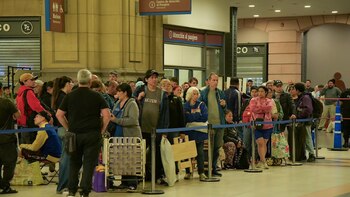
The III South American Youth Games beginning in 50 days in Rosario, Argentina, will open the calendar of sports mega-events in the American continent.
The event was able to survive the uncertainty the coronavirus pandemic marked in these two years, which has forced the postponement and cancellation of many sporting events around the globe.
It’s forecasted the Games will have a great social, sporting, economic and cultural legacy for the host city and country.
“All the adjustments and set-up tasks are being done to arrive in the best conditions,” the president of the Argentine Olympic Committee, Mario Moccia, tells Around The Rings.
The Games will be held in Rosario, about 280 km from Buenos Aires, from April 28 to May 8 and will have an important educational and cultural proposal together with the sports program
More than 2,000 competitors between the ages of 14 and 18, representing the 15 countries of the South American Sports Organization, will compete in 26 disciplines, the vast majority of them featured in the Olympic program. There will also be competitions in beach handball and indoor soccer.
The Independence Park will become the Unique South American Park where all the sports events, the different operational centers and an arts festival will take place.
“The Games promise to be innovative and sustainable,” says Moccia, which recalled the success of the Youth Olympic Games in 2018 in which he served as sports director within the Organizing Committee
Moccia is also the first vice president of the Organización Deportiva Suramericana (ODESUR), so his attention is doubly important to the youth multidisciplinary contest.

Moccia, a key figure in national and continental handball, was elected as head of the Argentine Olympic Committee (COA) last October for the period 2021-2025 after three terms of Gerardo Werthein, who is currently part of the Executive Commission of the International Olympic Committee (IOC). During all this time, Moccia was also secretary general of the COA.
The Argentine manager has recognized “the challenges are many” and are in tune with the policy implemented so far and will continue moving forward.
“We are working on strategic planning towards 2032. We want to discuss with the national federations where we are after COVID-19, what state we are in and how we can project ourselves for each Games and in the next three Olympic cycles,” he said.
In Rosario 2022, in a few days many young people will be seen who are outlined within those Olympic strategic plans, not only from Argentina, but from South America in general in a scenario that hopefully will be definitively “post COVID.”
The Games will become a reality despite a pandemic that saw the shutdown of federative competitions for a year-and-a-half. Since March 2020, only soccer and some other sports were able to continue to play, with some adjustments.
The pandemic forced the Rosario Games to be postponed for a year, which in 2021 were connected to the 2022 Youth Olympic Games in Dakar, Senegal, which were postponed by the IOC until 2026.
“The Games in Rosario come to cover the space that was left free with the postponement of Dakar 2022. This sporting generation from South America had been preparing to crown its preparation in Senegal, now it will do so in Rosario,” reflects Moccia.
Both the COA and ODESUR are confident in the ability of the organizers of Rosario 2022 to make a success of the new commitment of a city, one which already has received praise in 2019 when it hosted the South American Beach Games.
Due to the global pandemic and the historic number of postponements and suspensions of international sporting events, including the postponement of the Tokyo 2020 Olympic Games by a year, the 2022 and 2023 calendars have become perhaps the most packed in history.
In addition to Rosario 2022, the Caribbean Games appear in Guadeloupe in June, the South American Games in Asunción, Paraguay, and the Central American Games in Costa Rica and Guatemala in October. On the continent there are also the World Games based in Birmingham, Alabama, in the United States, with some 100 countries taking part.
Últimas Noticias
Gustavo Petro no deja de cometer errores en sus publicaciones en X: cuestionamientos al equipo de comunicaciones de Presidencia

El polémico César Lorduy es el nuevo presidente del Consejo Nacional Electoral: fue acusado de feminicidio

Ocde aseguró que economía colombiana estará mejor de lo pensado en el 2024

Creadora de contenido vestida de pielroja alborotó a los barranquilleros antes, después y durante el partido

Rugby 7s: the best player of 2023 would only play the medal match in Paris





